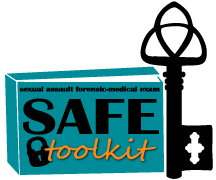THE COST OF NOT TESTING SAFE KITS IN KENTUCKY: AN ECONOMIC HARM STUDY
JANUARY 1, 2018
A REPORT FOR THE SEXUAL ASSAULT RESPONSE TEAM ADVISORY COMMITTEE
By Stephenie Hoelscher, SSH Consulting
FOREWARD
In a perfect world, one with infinite resources, this exercise wouldn’t be necessary. But we live in an imperfect world and a Commonwealth with limited resources, where tough decisions must be made to prioritize spending on vital public services.
The purpose of this exercise is to help policymakers in that process by demonstrating the economic cost to crime victims and taxpayers of not previously testing more than 3,000 Sexual Assault Forensic Evidence (SAFE) kits. And the study goes further, taking an early look at the real threat to public safety rapists posed to Kentuckians when those SAFE kits went untested.
In short, this exercise makes clear that it would cost victims and taxpayers less to test all SAFE kits swiftly upon collection than to shelve kits and allow perpetrators to commit new crimes. Legislation passed in 2016 now requires all kits to be tested, but how quickly that happens will always be contingent upon lawmakers adequately funding the Kentucky State Police (KSP) Forensic Laboratory.
This report looks at the first one-third of SAFE kits that were analyzed with a one-time grant awarded to KSP. It finds that the crimes those individuals committed after the assaults in which the kits originally went untested cost victims and taxpayers $4.2 million. This figure represents direct economic losses suffered by crime victims, including medical care costs, lost earnings, and property loss/damage, as well as costs to Kentucky’s criminal justice system. That includes the money spent on police protection, legal and adjudication services, and corrections programs, including incarceration.
The biology section of the KSP Forensic Laboratory, by comparison, needs $3.5 million annually to test all DNA evidence – not just from sexual assaults – in a timely manner.
At a time when policymakers are trying to rein in spending on Kentucky’s criminal justice system, and specifically its prisons, it would be prudent to examine the costs we incur by missing opportunities to catch serial criminals in their tracks. We know that rapists are often serial criminals. Someone willing to commit violent, intimate crimes against another person poses the highest risk to other persons and property. Investigating and prosecuting these individuals to the fullest extent possible improves public safety and saves money.
Two of the nearly 1,000 offenders examined in this report went on to commit and be convicted of manslaughter and reckless homicide, each costing victims and taxpayers more than $1 million. When DNA from the offender convicted of manslaughter was entered into CODIS last year, it hit to an unsolved murder in Missouri and the recently-tested SAFE kit. DNA evidence solves crimes.
Twelve sexual assaults were committed after the sexual assaults in which the kits went untested. Thirty-five aggravated assaults and five robberies were committed. These are crimes on which offenders were convicted. We will never know all the crimes they committed.
This study also finds that about half the offenders who went on to commit crimes after the sexual assaults in which the kits went untested were not known suspects at the time. Some of these DNA profiles immediately would’ve matched to named offenders, potentially aiding authorities in pursuing an arrest and prosecution. In one case, an offender was convicted of sodomy 15 years before the sexual assault in which the SAFE kit went untested. He is awaiting three trials on two separate murder cases and an assault case. Had the SAFE kit been tested immediately, the DNA evidence in the kit would have immediately matched to this serial criminal. And, it’s possible that he would not have had the opportunity to commit some of the crimes for which charges are currently pending.
Additionally, the exercise has thus far identified at least 13 serial rapists, with some having committed sexual offenses prior to the assaults in which the kits went untested, and some having committed sexual offenses after.
Going forward, KSP expects another 1,000 of the previously untested kits to produce DNA profiles that are eligible for upload into the crime databases. It is anticipated that the costs of crimes these perpetrators went on to commit will increase, and more serial offenders will be identified.
This initial exercise, as expected, supports the call for increased funding for the KSP Forensic Laboratory. Kentucky’s forensic analysts are the lowest paid in the country. In practical terms, that has meant a 40 percent, five-year turnover rate of analysts who Kentucky spends between six months and two years training at a significant economic cost to taxpayers. The turnover creates significant delays in processing all forensic evidence, not just that from sexual assault cases.
Adequately funding the Forensic Laboratory would ensure SAFE kits and all other DNA evidence are tested in a timely manner, aiding law enforcement in identifying suspects and building cases for prosecution. Taking even a few more of these high-risk, high-level offenders off the streets would improve public safety and save taxpayer dollars. >> Read More
Special Thanks
The following individuals contributed to this report:
KSP Forensic Laboratory Director Laura Sudkamp
KSP DNA Database Supervisor Regina Wells
KSP Laboratory Supervisor Whitney Collins
Cuyahoga County Prosecutor’s Office Special Investigations Chief Rick Bell
University of Louisville Assistant Professor Brad Campbell
KASAP Executive Director Eileen Recktenwald
KASAP Staff Attorney Laela Kashan





